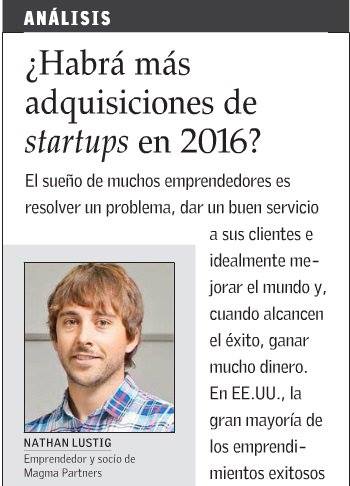Note: A version of this article originally appeared as a column in Spanish in El Mercurio, one of Chile’s largest newspapers.
Many entrepreneurs dream of solving a problem, providing great service to their clients and ideally doing something that makes the world a better place when they start their company. One of the side effects of a successful startup is that they might make lots of money.
In the US, many successful startups are acquired by competitors.
Facebook, Google, Twitter, Apple, along with many other US tech companies, buy dozens, if not hundreds, of startups per year. But in Chile and more generally South America, acquisitions are much less common and those that do happen are generally done by foreign companies, like Groupon buying two Chilean startups, or Food Hero buying up Latin American food delivery startups. Or they’re for amounts that are much less than if the same company was located in the US.
Many people say that it’s because Chile is a small market, or because the ecosystem isn’t well developed. Most of the time, they’re right, but there are two structural factors that have limited Chilean acquisitions so far.
In the US, the biggest acquirers are usually large, established publicly traded companies and startups with loads of investor money. And as we all know, it’s much easier to spend someone else’s money (VCs and public investors) than taking it right out of your own pocket. In Chile, the vast majority of the biggest companies are controlled by families that don’t have VC money or lots of public market money to spend. If they make an acquisition, they’re actually taking money out of their own pocket!
In the US, large companies are worried that a small startup is going to disrput their market, replacing the legacy company. We’ve seen it many times before in the US with Amazon, Netflix, Uber and many more.
But in Chile, there haven’t been any startups that have really hurt a large company. These companies aren’t truly scared of startups. Could 2016 be the year that a Chilean startup starts to find enough success to scare one of the large Chilean companies enough to push them to make an acquisition?
